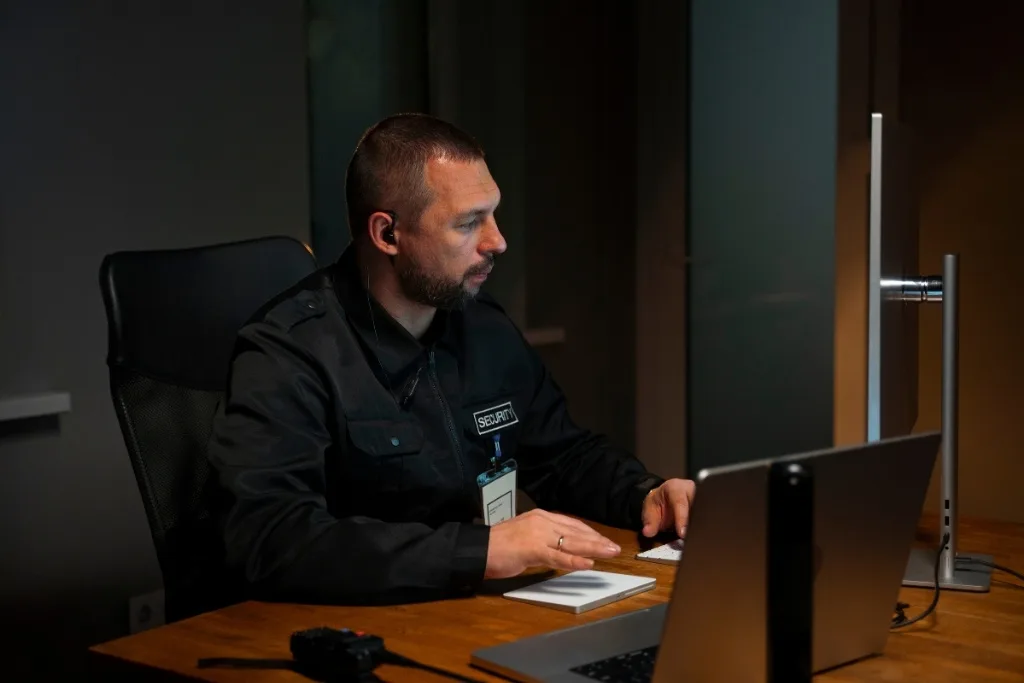That unexplained inventory shrinkage. The confidential product designs that somehow appeared in a competitor’s catalog. The executive assistant with sudden unexplained wealth. The threatening emails targeting your C-suite. When these situations arise, you need more than suspicion – you need facts. Corporate security investigations uncover the truth when business assets, reputation, or personnel are at risk.
Unlike police investigations that become public record, professional corporate investigations maintain the discretion essential for protecting your company while gathering the evidence needed for appropriate action.
This guide explains what corporate investigations entail, when they’re necessary, and how to engage professional investigators who understand the unique sensitivities of executive-level business concerns. When suspicions arise, knowing how to properly investigate can mean the difference between effective resolution and costly mistakes.
What Is a Corporate Security Investigation?

A corporate security investigation is a professional, systematic inquiry conducted to uncover facts about suspected threats, misconduct, fraud, theft, or security breaches within an organization. Unlike internal reviews by managers or HR departments, professional investigations follow established methodologies designed to gather legally admissible evidence while maintaining confidentiality. The goal is to establish the truth about situations affecting business assets, operations, or personnel.
These investigations protect businesses by:
- Uncovering facts rather than relying on suspicions
- Documenting evidence that supports employment or legal action
- Identifying security vulnerabilities before they cause major losses
- Determining the full scope of problems beyond initial incidents
- Providing actionable intelligence for executive decision-making
For executives and business owners, professional investigations offer the discrete fact-finding essential for addressing sensitive situations without creating unnecessary disruption or liability. Similar to the approach discussed in our security crisis management guide, these investigations balance thorough inquiry with operational discretion.
What Is Covert Investigation and When Is It Necessary?
Covert investigation refers to an inquiry conducted without the subject’s knowledge, preserving evidence integrity and preventing warning those under suspicion.
When Covert Approaches Are Necessary
Situation | Why Covert Methods Help | Typical Approaches |
Suspected Ongoing Theft | Prevents destruction of evidence | Surveillance, accounting analysis, and inventory monitoring |
Executive Misconduct | Maintains organizational stability | Discreet interviews, document review, and background verification |
Intellectual Property Theft | Prevents further data exfiltration | Digital forensics, access monitoring, pattern analysis |
Fraud Schemes | Documents the full scope of activities | Financial analysis, transaction monitoring, vendor verification |
Professional investigators operate within legal boundaries using techniques like discreet surveillance, confidential interviews with colleagues, and electronic monitoring where legally permitted. The key is gathering evidence without alerting subjects, who might otherwise destroy records, coordinate stories, or accelerate harmful activities if they knew they were under investigation.
For high-stakes business situations, covert approaches similar to those outlined in our TSCM (Technical Surveillance Counter-Measures) article provide the intelligence needed while preserving your organization’s operational stability.
Types of Corporate Investigations
Different business concerns require specialized investigative approaches. Here are the main types of corporate investigations that executives and business owners typically require:
Employee Theft and Financial Fraud Investigations
These investigations address suspected embezzlement, asset misappropriation, expense fraud, inventory theft, and accounting irregularities. Investigators typically:
- Analyze financial records for inconsistencies
- Review expense reports and reimbursement patterns
- Conduct discreet surveillance if physical theft is suspected
- Examine access logs and building entry records
- Perform digital forensics on company devices
- Interview relevant witnesses without alerting the main subjects
When handled properly, these investigations document patterns rather than isolated incidents, establishing the full scope of losses and identifying all involved parties before action is taken.
Executive Misconduct and Due Diligence Investigations
Investigations involving senior leadership require exceptional sensitivity and discretion. These address conflicts of interest, undisclosed relationships, policy violations, or ethical breaches that could create liability or reputational damage.
The process typically includes thorough background verification beyond standard pre-employment checks, examination of external business interests, review of contract awards or vendor relationships, and confidential interviews with relevant parties. For family businesses or closely-held companies, these investigations require an understanding of complex personal and professional relationships.
Intellectual Property Theft and Trade Secret Investigations
When proprietary information, customer data, product designs, or competitive intelligence appears to be compromised, these investigations identify the source and scope of the breach.
Investigators examine:
- Digital evidence of unauthorized access or downloads
- Communications with competitors or external parties
- Unusual access patterns to sensitive systems
- Device forensics for evidence of data exfiltration
- Employee behavior changes coinciding with data loss
These investigations build cases for potential legal action while identifying security vulnerabilities that need remediation, similar to aspects of security crisis management investigations, but focused specifically on intellectual assets.
Workplace Violence Threat Assessments
When concerning behaviors, threatening communications, or workplace conflicts escalate, these investigations assess credibility and recommend appropriate protective measures. Investigators evaluate the subject’s history, capability, and intent while assessing contextual factors that might influence risk. The goal is to differentiate between empty threats and situations requiring intervention through personal security measures or law enforcement involvement.
How Corporate Security Investigations Work
Professional investigations follow a structured process ensuring thorough, legally defensible results:
Step 1: Consultation and Scope Definition
The process begins with a confidential meeting between investigators and key stakeholders to:
- Understand specific concerns and existing evidence
- Define investigation objectives and limitations
- Establish confidentiality protocols
- Identify relevant documents, systems, and witnesses
- Develop timeline and reporting expectations
This planning phase ensures investigations remain focused on specific objectives rather than becoming open-ended fishing expeditions that risk operational disruption.
Step 2: Evidence Collection and Investigation
Investigators systematically gather evidence through methods appropriate to the case:
- Document analysis and financial record examination
- Witness interviews were conducted with appropriate discretion
- Digital forensics and electronic evidence preservation
- Surveillance when legally appropriate
- Background investigations of relevant subjects
- Supply chain or vendor verification
Throughout this phase, investigators maintain proper evidence handling protocols, ensuring findings remain admissible if legal action becomes necessary.
Step 3: Analysis and Reporting
The final phase involves analyzing evidence to establish facts and deliver comprehensive reporting, including:
- Documented findings with supporting evidence
- Conclusions based on factual analysis
- Recommendations for remedial action
- Options for addressing vulnerabilities
- Expert testimony if cases proceed to legal action
Professional reporting focuses on facts rather than speculation, providing executives with clear intelligence for decision-making while creating defensible documentation if employment actions or legal proceedings result.
Choosing a Professional Corporate Investigation Firm

Selecting qualified investigators requires evaluating credentials, experience, and approach:
Key Qualifications for Corporate Investigation Firms
- Professional Backgrounds – Look for firms employing former law enforcement, intelligence professionals, or certified fraud examiners
- Licensing – Ensure investigators maintain appropriate private investigator licensing for your jurisdiction
- Experience – Verify experience with similar cases involving executive-level concerns
- Discretion – Assess their protocols for maintaining confidentiality throughout investigations
- Reporting – Evaluate sample reports for clarity, professionalism, and actionable conclusions
- Legal Knowledge – Confirm understanding of employment law, evidence standards, and corporate liability.
The best investigation firms understand executive-level sensitivities and conduct inquiries without disrupting operations. They act as trusted advisors who provide intelligence while protecting organizational stability.
Frequently Asked Questions
How much does a corporate security investigation cost?
Basic investigations typically range from $5,000 to $15,000, depending on scope. Complex fraud or intellectual property cases involving multiple subjects or locations can range from $15,000-50,000+. Most firms offer initial consultations to provide specific cost estimates based on your situation.
How long do corporate investigations take?
Timeframes vary by complexity – basic investigations typically require 2-3 weeks, while complex cases may take 4-8 weeks. Emergency situations can receive preliminary findings within days, followed by a more comprehensive investigation.
Can you fire an employee based on investigation findings?
Yes, when investigations document clear policy violations or misconduct. Ensure findings are well-documented, termination decisions follow company policies, and actions are consistent with how similar situations have been handled to reduce wrongful termination risks.
What is the difference between an internal audit and an investigation?
Internal audits are routine reviews of processes and controls focusing on system improvement, while investigations target specific suspected wrongdoing with the goal of establishing facts about particular incidents or individuals. Investigations are more targeted and typically more sensitive than general audits.
Final Thoughts
Professional corporate investigations provide the intelligence executives need when facing suspected misconduct, theft, or security concerns within their organizations. By establishing facts rather than acting on suspicions, these investigations enable confident decision-making while minimizing liability and operational disruption.
For business owners and executives, having access to discreet, professional investigation capabilities represents an essential component of comprehensive risk management and corporate security.
Whether you’re dealing with specific concerns or want to discuss how professional investigations complement your existing security framework, contact HK Defense Solutions for a confidential consultation about our corporate investigation services.
